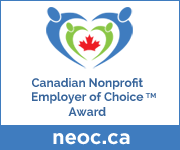- Home
- About Us
- The Team / Contact Us
- Books and Resources
- Privacy Policy
- Nonprofit Employer of Choice Award

 There are many challenges facing non-profits (NP) today including:
There are many challenges facing non-profits (NP) today including:
Nonprofit Boards are becoming more sophisticated in navigating these challenges through an array of leadership and governance resources like the Institute for Corporate Directors and other non-profit leadership institutes. Boards are placing greater responsibility on the Executive Director (ED) role for managing and reporting on various forms of organization risk (financial and human resource).
The Canadian Nonprofit Employer of Choice (NEOC) Award is becoming a valuable leadership resource for supporting EDs in their assessment, management and Board reporting of human resource (HR) risks. Data collected through the submission process can inform HR program updates to ensure they manage against talent attraction, workforce engagement and compliance risks. Also, the various summary and benchmark reports can supplement Board reporting package to support their fiduciary and governance roles.
Against this backdrop of risk management, it’s likely that all previous NEOC Award program participants have begun to consider the operational impact of the proposed Ontario Fair Workplace Act (Bill 148). We would encourage all nonprofits to do the same. A scan of the Schedule 1 section which highlights proposed changes to the Employment Standards Act (ESA) suggests nonprofits could be subject to minimum wage impact and would be subject to increased employee benefits costs.
Wage increases impact financial liabilities. nonprofits could realize a 36% cumulative wage increase for some jobs by January 1, 2019. Additionally, given the nature of some NP services , they could also be impacted by the “Equal pay for Equal Work” provision – after all, if a crisis intervention worker takes an unplanned leave of absence, it’s not expected his/her clients should wait for service. The proposed extensions for employee benefits including vacation and various forms of leave will require a review of operating budget/accruals. These changes will impact future liabilities. Board members should be made aware of these incremental HR costs and associated strategy for addressing any related talent management risks such as workforce reduction.
Although it appears that Bill 148 was crafted with the private sector in mind, the nonprofit sector also has contractual employment relationships and is, therefore, subject to ESA compliance. Like the advocacy voice of the Ontario Chamber of Commerce the nonprofit sector needs a similar advocacy voice to ensure funders are aware of the potential impact of Bill 148 on future operational liabilities, talent management and compliance risks.
Regardless of political outcomes, Bill 148 serves as a strong reminder for NPs to periodically audit their HR capacity as part of their governance, operational risk and talent management efforts – perhaps through a shared service or center of excellence approach.
Collectively these leadership efforts reflect the ethos of the NEOC Award.
 Dave Nanderam is the Managing Partner at ASSOCIUM Consultants which has been providing human resource advisory services to the non-profit sector for over 30 years.
Dave Nanderam is the Managing Partner at ASSOCIUM Consultants which has been providing human resource advisory services to the non-profit sector for over 30 years.

Jack Sullens is the Chief Legal and Human Resources Officer for the Windsor-Essex Children’s Aid Society and is also a Management Member with the Ontario Labour Relations Board.